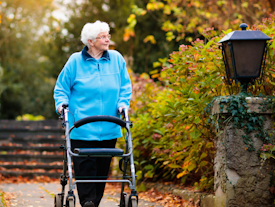Is It Time To Get A Walker? How A Walker Can Keep A Senior Safe
Aging often brings mobility challenges, making it harder for seniors in Canada to maintain their independence. Walkers for seniors offer necessary support, helping to ensure safety and confidence in daily activities. Uncover the benefits of walkers, learning how they can address mobility issues and enhance the quality of life for seniors. Whether for personal use or a loved one, comprehending these advantages is paramount to making informed decisions about mobility aids.
Life Assure Product Quiz
Take our 30 second quiz and discover which Life Assure medical alert device is the right fit for you or a loved ones.
Life Assure Product Quiz
Take our 30 second quiz and discover which Life Assure medical alert device is the right fit for you or a loved ones.
Recognizing The Need For Walkers
Challenges such as reduced strength and balance in older age make everyday tasks more difficult. Conditions such as arthritis and osteoporosis can further complicate mobility, increasing the risk of falls. These issues can lead to a loss of independence and affect quality of life.
Walkers for seniors are designed to tackle these challenges head-on. They offer stability and support, making walking easier and reducing the risk of falls. With a reliable walker, seniors can move around more confidently and safely, which is critical for maintaining an active and independent lifestyle.
Benefits Of Using A Walker

Walkers offer seniors more than just a way to get around—they support maintaining balance and stability. This is especially crucial for preventing falls, which can lead to serious injuries like fractures or head trauma. By offering a sturdy frame, walkers help seniors move confidently, reducing the risk of accidents that could impact their independence.
Using a walker also encourages better posture and a more deliberate walking style. This can be particularly helpful on uneven or slippery surfaces, where maintaining balance is necessary. The physical benefits are clear, but walkers also offer psychological advantages. Knowing there's reliable support can ease anxiety about mobility, allowing seniors to participate more in social and recreational activities. This boost in confidence can lead to a more active lifestyle, which is advantageous for physical and mental health. Walkers empower seniors to explore their surroundings with greater ease and assurance.
Enhancing Independence
Walkers give seniors the confidence to tackle everyday tasks on their own. With the right support, they can move around their homes and communities more easily, whether it's running errands, visiting friends, or enjoying a walk in the park. This independence makes life more convenient and enriches their overall quality of life.
Beyond physical benefits, staying independent has a big impact on mental health. Being able to move freely without needing help boosts self-esteem and reduces feelings of dependency. This newfound confidence encourages seniors to be more socially active, participating in community events and family gatherings. Such social interactions are vital for mental health, helping to combat loneliness and depression.
Walkers for seniors are more than just mobility aids; they are essential tools for maintaining independence and promoting a healthier, more fulfilling lifestyle. By supporting both physical and emotional well-being, walkers help seniors enjoy their later years with confidence and dignity.
Promoting Physical Health
Walkers are instrumental in keeping seniors active and vital for maintaining good health. Regular use can boost cardiovascular fitness, strengthen muscles, and improve joint flexibility. These benefits enhance balance and coordination, helping to prevent falls and injuries.
Staying active with a walker also aids in weight management and boosts energy levels. The consistent movement helps maintain a healthy metabolism and can improve sleep quality. By encouraging regular physical activity, walkers support a healthier lifestyle, which is helpful for seniors to maintain their independence and quality of life.
Types Of Walkers For Seniors
Seniors have several walker options, each catering to different needs and preferences. Understanding the features of each type can help you select the most suitable one.
Standard Walkers
Standard walkers, with their four sturdy legs, provide maximum support. They are ideal for those needing significant stability and are lightweight, making them easy to maneuver indoors on flat surfaces. These walkers are particularly beneficial for recovering from surgery or severe mobility challenges.
Rollators
Rollators, equipped with wheels and often a seat and storage, are perfect for seniors with better balance who need a walker for longer distances or outdoor use. The seat offers a convenient resting option, and the wheels ensure smooth movement on uneven terrain. Rollators are versatile, enhancing mobility and independence for active seniors.
Choosing The Right Walker
Selecting the right walker is necessary for safety and comfort. Consider factors like height, weight capacity, and the terrain typically encountered. A properly fitted walker should allow the user to stand upright with a slight bend in the elbows when holding the grips.
Assess individual needs carefully. For example, those who need frequent breaks might prefer a rollator with a seat, while those requiring maximum support might opt for a standard walker. Consulting a healthcare professional can provide valuable guidance in choosing the appropriate mobility aid.
Safety Tips For Using Walkers

Seniors should adhere to several safety guidelines when using a walker to ensure optimal use and prevent injuries. When standing upright, adjust the walker to the correct height; the hand grips should be at wrist level. This helps maintain proper posture and reduces strain on the back and shoulders.
Seniors should move the walker a short distance ahead before stepping forward, ensuring all four legs or wheels are stable on the ground before proceeding. For those using rollators, engage the brakes before sitting or standing up to prevent any unintended movement.
Keep pathways clutter-free and ensure adequate lighting to avoid trips and falls. In addition, wearing non-slip footwear can provide extra traction and stability. Regularly check the walker for wear and tear, adjust the height for comfort, and ensure the brakes function if using a rollator. By following these guidelines, seniors can maximize the benefits of their walkers while minimizing the risk of accidents.
Conclusion
Walkers are invaluable for maintaining independence and safety. They offer stability and support, empowering seniors to lead active and fulfilling lives. The benefits of using a walker are multifaceted, from enhancing physical health to boosting confidence. For seniors in Canada, investing in a walker can significantly improve their quality of life, enabling them to enjoy their golden years with dignity and assurance. Encourage seniors to use a walker to embrace a more active and independent lifestyle.











 Get Help With The Push Of A Button
Get Help With The Push Of A Button














